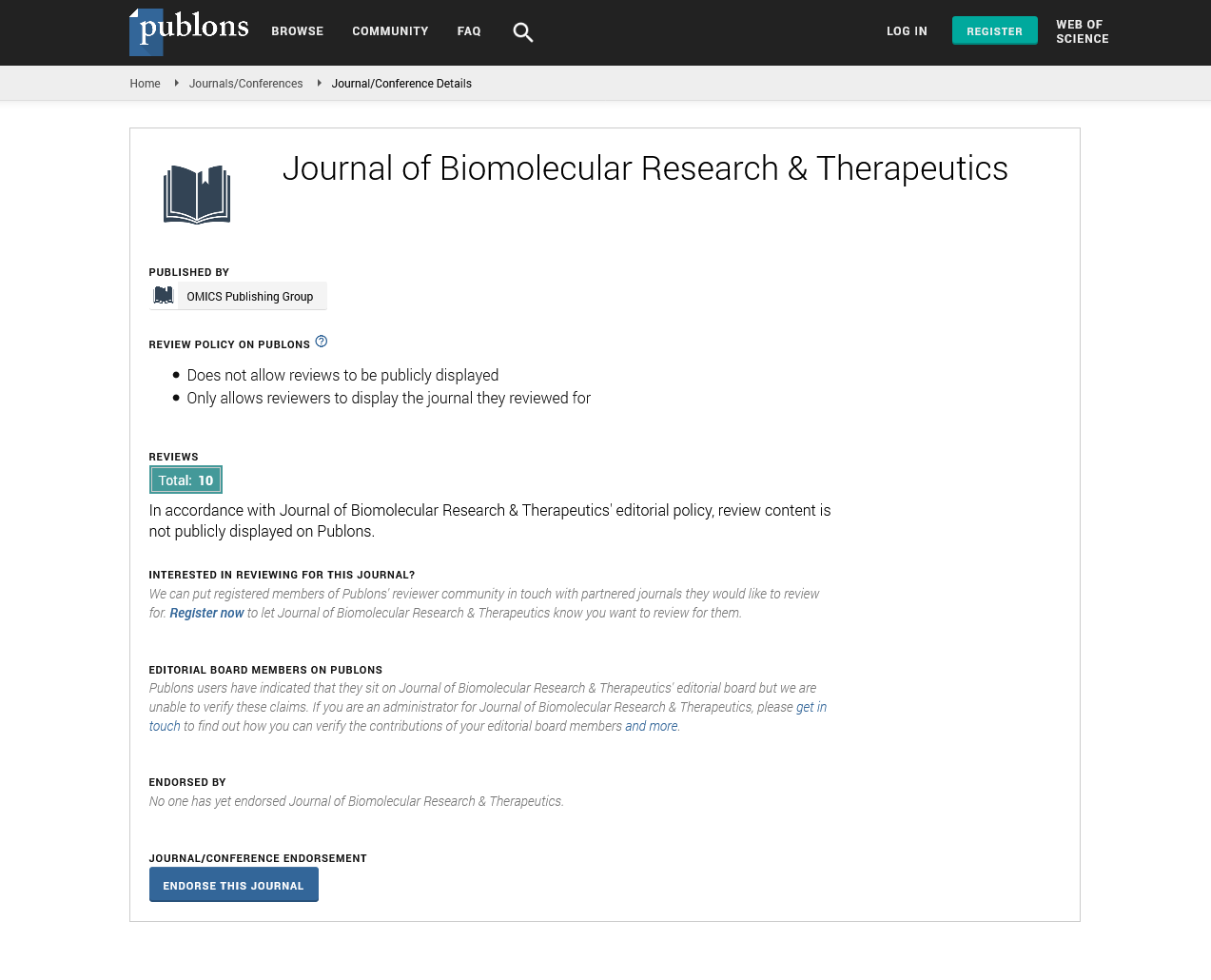Indexed In
- Open J Gate
- Genamics JournalSeek
- ResearchBible
- Electronic Journals Library
- RefSeek
- Hamdard University
- EBSCO A-Z
- OCLC- WorldCat
- SWB online catalog
- Virtual Library of Biology (vifabio)
- Publons
- Euro Pub
- Google Scholar
Useful Links
Share This Page
Journal Flyer

Open Access Journals
- Agri and Aquaculture
- Biochemistry
- Bioinformatics & Systems Biology
- Business & Management
- Chemistry
- Clinical Sciences
- Engineering
- Food & Nutrition
- General Science
- Genetics & Molecular Biology
- Immunology & Microbiology
- Medical Sciences
- Neuroscience & Psychology
- Nursing & Health Care
- Pharmaceutical Sciences
Opinion - (2025) Volume 14, Issue 2
The Potential of Microbiome Modulation in Therapeutic Development
Ana Oliveira*Received: 28-Mar-2025, Manuscript No. BOM-25-29597; Editor assigned: 31-Mar-2025, Pre QC No. BOM-25-29597; Reviewed: 14-Apr-2025, QC No. BOM-25-29597; Revised: 19-Apr-2025, Manuscript No. BOM-25-29597; Published: 28-Apr-2025, DOI: 10.35248/2167-7956.25.14.432
Description
The human microbiome has emerged as a critical factor influencing health and disease. Comprising trillions of microorganisms inhabiting the gut, skin and other body sites, the microbiome plays key roles in metabolism, immune regulation and protection against pathogens. Recent advances in sequencing and computational analysis have revealed strong associations between microbiome composition and a wide range of conditions, from gastrointestinal disorders to neurological diseases. This has fueled interest in microbiome-targeted therapies as a new frontier in biomedical research. Probiotics and prebiotics represent the most established approaches to modulating the microbiome. Probiotics introduce beneficial microorganisms into the gut, while prebiotics provide nutrients that promote the growth of these organisms. Clinical studies suggest that probiotics can reduce symptoms in conditions such as irritable bowel syndrome and antibiotic-associated diarrhea. Prebiotics, including certain dietary fibers, enhance the abundance of beneficial bacteria like bifid bacteria and lactobacilli, contributing to improved gut health.
Fecal microbiota transplantation has gained attention for its remarkable effectiveness in treating recurrent clostridioides difficile infections. By transferring stool from a healthy donor to a patient, the gut microbiome can be reestablished, restoring balance and eliminating pathogenic bacteria. Research is now investigating the use of fecal transplantation for other conditions, including inflammatory bowel disease, metabolic syndrome and even psychiatric disorders. Microbiome modulation is also being explored in oncology. Studies have shown that the composition of gut bacteria influences responses to immunotherapy, with certain microbial communities enhancing efficacy. This has prompted efforts to develop microbial-based biomarkers to predict treatment response and guide therapeutic strategies.
Despite these promising applications, challenges remain in translating microbiome research into reliable therapies. Individual variability in microbiome composition means that interventions may not work equally for everyone. Additionally, long-term safety of interventions such as fecal transplantation must be carefully evaluated. Regulatory frameworks are still evolving, raising questions about how microbiome-based therapies should be classified and approved. Advances in synthetic biology are opening new possibilities for microbiome modulation. Engineered microbes designed to produce therapeutic molecules or modulate host signaling pathways are under development. These approaches combine precision with adaptability, potentially allowing targeted interventions for specific diseases.
The potential of microbiome modulation lies not only in treating disease but also in preventive medicine. By maintaining a balanced and diverse microbiome, individuals may reduce their risk of developing chronic conditions. Continued investment in research and clinical trials will determine how microbiome-targeted therapies can be integrated into mainstream healthcare, offering novel strategies to enhance human health. In recent years, attention has also turned toward the role of the oral, skin and vaginal microbiomes, which, while less studied than the gut, are increasingly recognized for their contributions to systemic health. The oral microbiome, for instance, not only affects dental and periodontal health but also plays a role in cardiovascular and respiratory conditions. Imbalances in oral microbial populations have been linked to systemic inflammation and an increased risk of atherosclerosis. Similarly, the skin microbiome influences conditions like eczema, acne and psoriasis. Advances in topical probiotics and microbiome-friendly skincare aim to restore microbial balance and strengthen the skin’s barrier function.
Furthermore, the infant microbiome has become a subject of great interest, particularly in how it is shaped by birth method, feeding practices and early antibiotic exposure. Babies born via cesarean section often have different microbial colonization compared to those delivered vaginally, potentially influencing immune development and long-term health outcomes. Breastfeeding plays a vital role in seeding beneficial bacteria and supporting microbial diversity through human milk oligosaccharides, which act as natural prebiotics. Strategies to optimize microbial development in early life may have lasting benefits, including reduced risk of allergies, asthma and autoimmune diseases. Diet remains one of the most powerful and modifiable influences on the microbiome. Diets rich in fiber, plant-based foods and fermented products promote microbial diversity and increase the production of health-promoting metabolites. In contrast, high-fat, high-sugar and ultra-processed diets can reduce microbial richness and increase the presence of pro-inflammatory species. This dynamic relationship between diet and microbiome highlights the potential of personalized nutrition to support gut health and prevent disease.
Another emerging concept is the Chrono biome the interplay between the microbiome and the body’s circadian rhythms. Studies suggest that gut microbial populations fluctuate over the course of a day and are influenced by sleep-wake cycles, meal timing and light exposure. Disruptions in circadian rhythms, such as those experienced by shift workers, may negatively impact the microbiome and contribute to metabolic and immune dysfunction. Understanding these interactions could lead to novel lifestyle and dietary interventions that restore circadian and microbial balance. As the science of the microbiome evolves, it is becoming clear that its influence extends far beyond digestion. It interacts with nearly every physiological system and offers a promising target for a new generation of diagnostics, treatments and preventive strategies aimed at enhancing overall health and resilience.
Citation: Oliveira A (2025). The Potential of Microbiome Modulation in Therapeutic Development. 14.432
Copyright: © 2025 Oliveira A. This is an open access article distributed under the terms of the Creative Commons Attribution License, which permits unrestricted use, distribution and reproduction in any medium, provided the original author and source are credited

